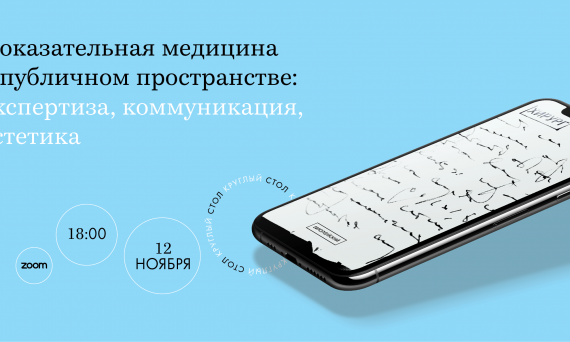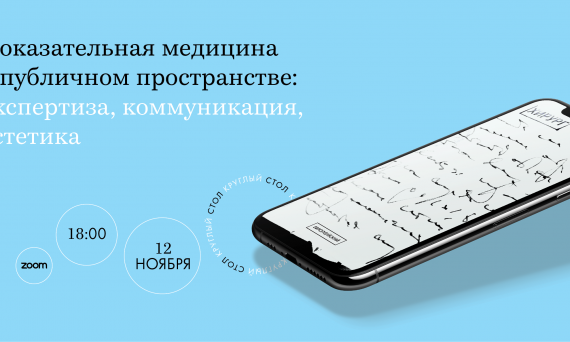Starting from the mid-2010, the concept of "evidence-based medicine" is becoming more popular in Russian-speaking media and appears not only on the websites of the clinics, but also in popular online publications about culture and politics, as well as on social networks. Telegram channels, publications in the media and instagram blogs of doctors and medical journalists increasingly attract the attention of both the professional community and the wide audience – potential patients and just interested readers.
Round table "Evidence-breeding medicine in public space: examination, communication, aesthetics"

Starting from the mid-2010, the concept of "evidence-based medicine" is becoming more popular in Russian-speaking media and appears not only on the websites of the clinics, but also in popular online publications about culture and politics, as well as on social networks. Telegram channels, publications in the media and instagram blogs of doctors and medical journalists increasingly attract the attention of both the professional community and the wide audience – potential patients and just interested readers. Thus, medical knowledge goes beyond medical organizations, scientific or research centers and becomes part of a public space.
Evidence-based medicine as a principle in practical health care is begins to change the relationship between professional groups, between the doctor and the patient: the commitment to clinical guidelines based on proven scientific data is increasingly perceived as a sign of professionalism of medical professionals. Moreover, the popularity is also gaining the image of an enlightened patient who has the skill of finding proven information from different areas of medicine. Social networks play a huge role in changing the role and status of a doctor and patient, standards of interaction between them, and the image of medicine in society. All these processes make up a problem that requires critical consideration within various disciplinary approaches – not only natural scientific, but also social and humanitarian.
Our round table is one of the first steps in this direction, since it opens an interdiscipliding discussion between doctors, medical journalists, bloggers, sociologists, historians and anthropologists.
As part of this event, we offer participants and listeners of the discussion to discuss three major circles of issues:
1. Expertise: What means is the image of a medical expert in media constructed? Who and how does the judgments about the criteria and the borders of the medical examination? What role the opponent's image is played in the self-presentation and positioning of medical experts, be it a supporter of homeopathy, a people's healer, "Instagram-Guru", etc.d. What are the possible historical backgrounds of modern conflict examinations in medicine?
2. Communication: Who is the audience of expert statements of doctors in the first place: colleagues, potential patients, opponents? What position is the authors of medical blogs – institutional or private? What is the ratio of the motives of the medical blogger – economic, vocational and pragmatic, moral and ethical, educational? Is it also possible to talk here about the historical continuity of the activities of medical experts in the USSR or even in the era of the Zemsky Movement? What is the role in the activities of blogger doctors playing feedback of readers? How do medical blogs design a patient's image? How is the idea of the borders of personal and professional in medical blogs?
3. Aesthetics: Is the visual component meaningful for the presentation of the principles of evidence-based medicine in the public space? What visual funds are used to strengthen the expert statement? What are the guided doctors / medical journalists when choosing a blog stylistry? What are the main design criteria for a medical blog interface (emotional impact, simplicity of navigation, readability, compliance with visual filling the topic of the post)? What new, unpreicious techniques for medical texts turned out to be effective in medical blogs (memes, photo shoots)?
List of participants
Organization: Anastasia Novkun (EUSPB), Yulia Karpova (an archive of an open society, Budapest), Pavel Vasilyev (HSE – St. Petersburg)
Moderation:
Julia Karpova (historian, an archive of an open society, Budapest)
Roxana Muharyamov (Popularized medicine, author of the blog Evidence-Based Club and the Corganizer of the Annual Conference Doc Talks)
Participants of the discussion:
Polina Shilo (oncologist doctor, clinic "Light", program director of the Higher School of Oncology, author of Instagram-blog @doc_shilo)
Ekaterina Borozdina (sociologist, associate professor and dean of the Faculty of Sociology EUSP)
Pavel Vasilyev (Historian, HSE – St. Petersburg)
Anna Gelser (Biomedicine researcher, director of the center of J. Riley at the University of Notre Dame (USA)
Olga Kashubin (medical journalist, medical heading editor in the T-F edition, author of the telegram channel "SBMK" and instagram blog @shb_mnk)
Evdokia Tsvetkov (endocrinologist, medical center Positivemed, St. Petersburg, author of the telegram channel "endonomy" and instagram blog @endocrinolognews)
To participate, you need to register, the link to zoom will be sent to the specified postal address an hour before the start of the event.

